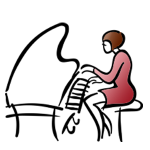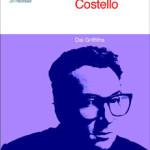NaBloPoMo Day 10!
The other day, I started to relate how a bit of procrastinatory online reading had lain some new track for my train of thought (at times, my train of thought travels more like a pinball!). Well, maybe not completely new — these readings brought up a set of thoughts and ideas that have been swirling around in my brain for a long time now, and that I have often explored in conversation, but not in writing. No time like the present to get them down on paper up on-screen!
Here’s a little preview of where we’re headed:

Swipe your paw at Mr. Readmore to get all the juicy details!
As someone who has spent an embarrassingly long time as a graduate student, I’ve made a lot of jokes and, let’s be honest, talked a lot of trash about the whole enterprise. One of my standard lines is that if you stay in school long enough, you actually start to become dumber, rather than smarter. So imagine how gratified I was to find someone else express a similar thought! In Does Grad School Make You a Bad Reader?, musicologist Drew Massey explores how graduate education hampers one’s ability to read for pleasure, not to mention basic reading comprehension. That’s pretty ironic, since grad school is all about deepening one’s knowledge in the field one is passionate about, right? But the prevalent method of pursuing that noble end has unintended consequences. It starts out simply and logically enough:
Graduate students are taught to read… for argument and information, and – if not without pleasure – then definitely without much importance placed on the luxuriousness of the presentation… we are taught to read for flaws in the argument…
This strikes me as very similar to what annoyed me about the concert review I poked fun at the other day. I think there is fruitful work to be done beyond the level of simply finding flaws. What’s more, relentess, knee-jerk nitpicking can get in the way of genuine understanding:
somehow my training as a musicologist interrupted my reading of a passage that I think many readers would have grasped instantly.
What is even sadder, in my opinion — you can always go back and reread if you don’t get something, and if you’re worth your salt as a grad student, you will 😉 — is that by reading this way, you deprive yourself of a potentially enriching aesthetic experience:
Graduate school encourages you to focus your attention on certain aspects of reading… crippling one’s capacity to take pleasure in beautiful, elliptical, evocative prose.
The experience he describes sounds familiar to me. Quite frequently when I read newspaper or magazine articles, I find myself getting hung up on some logical or factual inconsistency or other, and even as I continue reading I’m thinking to myself, “That’s not true! This writer is a bonehead!” all the while remaining blissfully oblivious to the actual point the author is trying to make.
What’s worse, a couple of years into grad school, I realized that I had all but lost the ability to just like things, without qualification or analysis, without feeling slightly guilty about whatever flaws I might have failed to condemn vigorously enough, without worrying whether my grad school peers would approve. Of course, we were only trained to take this sort of hypercritical approach with music and music scholarship, and maybe other art forms if we had done our homework. But I think this way of relating to the world is like kudzu, or mold, or a virus: good luck trying to contain it. Pretty soon you’re casually and ham-handedly applying critical theory to everything that flies over your transom, including restaurant menus and the annual Holiday Letter from your Aunt Sally. You find yourself making sardonic comments in the grocery store. And then you wonder why folks outside of academia are vaguely uncomfortable around you.
Now, let me just make one thing perfectly clear at this point. I am not jumping on the bandwagon with folks who love to fling terms like “elitism” and “political correctness” at anything they don’t want to deal with. I’m all for intellectual rigor, I expect my elected officials to be smarter than me (yeah, I’ve learned to live with disappointment 😛 ), and I value diversity and respect.
To me, this is not about being anti-intellectual; it’s about being humane — an admittedly broad and amorphous concept that I’ll attempt to clarify as I take this topic further in the coming days (excessive self-justification/explication = one of the signs of academic infection! 😉 ).
Another link that caught my eye during my pre-blog-post surfing session related the trials and tribulations of a not-yet-tenured-but-hoping-to-be musicology professor working hard to jump on the publication merry-go-round: Musicological Dear John Letters, by Zoë Lang. The feedback she received from editors after submitting her work to scholarly journals would have been funny if it weren’t so career-jeopardizingly sad. Some samples:
‘pedantic yet supposedly well researched,’
An accusation of pedantry coming from the editor of a scholarly journal devoted to what is arguably a pretty darned arcane field seems rather redundant and self-satirizing, don’t you think?
The article was an interesting one, but not musicology.
Not having read the submitted article, I can’t form an opinion on this point, but I’ll tell you this: based on my experiences reading scholarly articles and hanging out with musicologists, I would be willing to bet you one million dollars that if an attempt were made to codify an authoritative definition of what musicology is, the musicologists of the world could hold all the conferences and round table discussions and online back-and-forths they wanted until the polar ice caps melted and the surviving humans fled to other planets, but it would never be accomplished.
According to the reader, I had not provided a sufficient political context for the piece.
Here’s one of many possible conundrums: depending on who is reading the article, it might contain too little political context, or too much; it might analyze a piece of music too thoroughly rather than focusing on its historical context (or any number of other parameters), or not thoroughly enough. It might be too short, too long, too dry in tone or too tongue-in-cheek… there is no pleasing these people! 👿
Considering, where we started, though — with the scorched-earth style of reading in which grad students are trained — none of this should come as a surprise! And yet it does, because in the face of unremitting evidence to the contrary, I think it is human nature to expect better from our fellow humans.
And I believe that what it boils down to is this: somewhere along the line, we learn that in order to win at life, we have to be right. We also come to the conclusion that in order to be certain that we are right, we have to assure ourselves that other people are wrong — otherwise, how can we tell? Sadly, though, the strategy is not conducive to playing well with others.
Next time, I’ll provide more evidence for this conclusion, and tell more hilarious tales of grad school adventures. You don’t want to miss it! (I’ve threatened in the past to write a musical about grad school. The multi-syllabic lyrics might be tricky to set to music, but at least the sets and costumes would be cheap. 😛 )

If you enjoyed this post, would you consider…
Thanks — you make the world a better place! 🙂




Well, I have to say that it is quite a honor to be cited in a blog after ranting on a blog. In fact, while very little of the musicological community is able to learn about my scholarship through publications, my one blog entry seems to be furthering my reputation by leaps and bounds!
The article has since been rejected again, although on a much faster timeline and with helpful feedback. In answer to your question ‘How did that happen,’ I sent it to a history journal instead of a musicology one. 🙂
I do appreciate your commentary, as it is always useful to Put Things Into Perspective (and as I’m sure you know, in academia Putting Things Into Perspective is rarely a priority).
Congratulations on completing your blog a day for a month, which is quite an achievement!